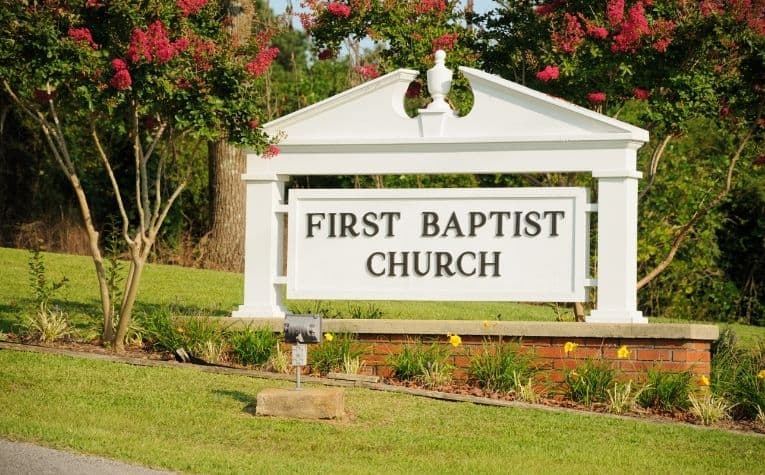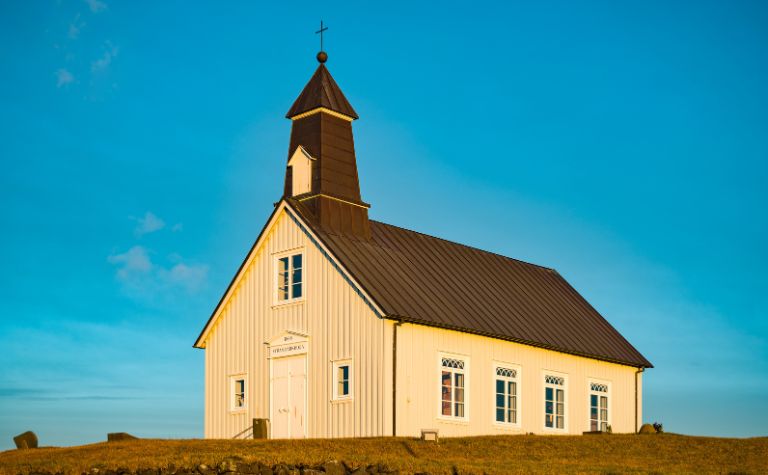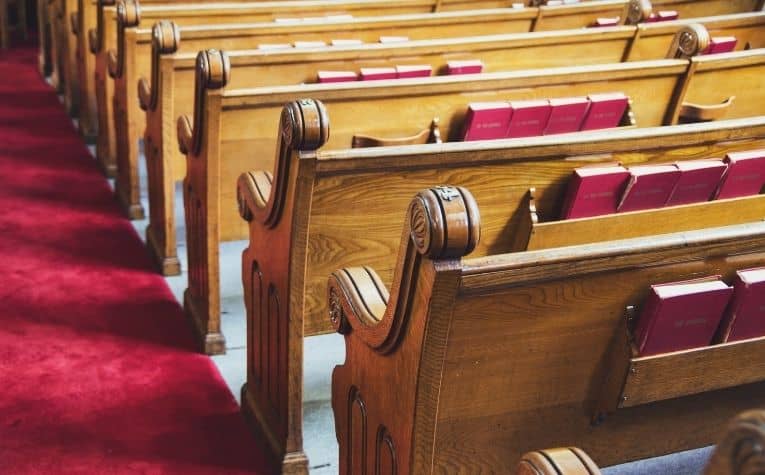Baptist and Lutheran are two of Christian history’s most influential Protestant denominations. Yet, while there are many commonalities between Baptist and Lutheran denominations, churches, and believers, there are also significant differences.
Lutherans and Baptists agree on several core beliefs of Christianity, including the Trinity, the authority of the Bible, and the centrality of Jesus Christ’s death on the cross for the forgiveness of sins and his resurrection from the dead. Yet, they have had differences on issues like the Lord’s Supper.
Baptist and Lutheran Christian traditions have positively impacted the Church of Jesus Christ. Members and churches that associate with these two branches of Christianity have shortcomings just like any other branch, but traditionally they have been faithful to the cause of Christ. It will benefit all readers to learn more about these two history-making branches of the Christian faith.
- The difference between what Lutherans and Baptists believe
- The difference between Lutheran and Baptist practices
- Statistics on the largest Lutheran and Baptist denominations

How Are Lutherans and Baptists Different?
It’a necessary today to distinguish between what Lutheran and Baptist churches have historically taught and believed and what some Lutheran and Baptist churches teach and believe today.
Like other denominations, some churches in these two branches of the Christian faith have replaced historic — some would say biblical — teachings with modern ones characterized as liberal or progressive.
The comparisons below will separate these two approaches to make clear the contrasts between these denominations based on centuries of teaching, not on changes some churches have made in the last decade or two. (Also see Lutheran vs. Non-Denominational: What’s the Difference?)
What Do Lutherans Believe?
Traditional Lutheran beliefs are rooted in the biblical interpretations of the German Reformer Martin Luther (1483-1546). Luther’s teaching, preaching, and writing about Scripture — and its subjects, like God, people, and the world — are essential cornerstones of Lutheran theology.
Historically, Lutheran beliefs have centered on the authority of the bible; that salvation is by grace through faith in Christ alone; that God is three in one, existing as a Trinity; that all people are born sinful; and that Jesus Christ will return to earth at an unknown time.
Though some liberal wings of Lutheranism, and some individual churches, have questioned certain historical beliefs in recent years, denominations like the Lutheran Church-Missouri Synod have held firm to classic Lutheran teachings. (Also see What Bible Translations Do Lutherans Use?)
Key term | synod: A “synod” is a gathering or assembly of a group, often within a denomination, of like-minded people who network or associate together for ministry effectiveness.
On these doctrines, Lutheranism unites with other Protestant Christian denominations that affirm these classic biblical teachings. Historically, most Baptist churches have held the same convictions about these biblical interpretations, so these denominations are united in these ways. (Also see Why Are Lutheran Churches Named After Saints?)
Since Martin Luther led the reform movement against the alleged excesses and abuses of the Roman Catholic church in the 16th century, most Protestant churches trace their heritage to him.
Some denominations, including some Baptist ones, acknowledge Luther’s influence on their origins, even though he wasn’t directly involved in establishing them. More directly, Baptist groups commonly trace their roots to 17th-century England. (Also see What’s the Most Conservative Lutheran Synod?)

Important Lutheran Doctrines
Two critical aspects of ecclesiology are water baptism, and the Lord’s Supper, also called the Eucharist. People observe both of these applications of New Testament teachings within the context of a church.
Key term | ecclesiology: As it relates to Christian theology, ecclesiology, simply defined, refers to the study of the church, which may include physical aspects like architecture, but mostly it refers studying the meaning, compositions, duties, and purposes of the Christian church worldwide.
- Water baptism: Lutherans believe water baptism (as opposed to a “baptism of the spirit,” for example) is a saving work of God that ministers administer to infants and adults. Salvation doesn’t depend on baptism, according to historic Lutheran teaching, but it is a means through which God establishes faith, according to verses like Titus 3:5.
- The Lord’s Supper: Known by various denominations as the Lord’s Supper or the Mass, or the Eucharist, Lutheranism teaches that the body and blood of Christ are truly present “in, with, and under” the elements. [1]. Jesus describes the Lord’s Supper in Matthew 26:26-29.
| Catholic view | Lutheran view | Wider Protestant View |
|---|---|---|
| Preferred term: “sacrament.” | Christ’s body and blood are “in, with, and under” the bread and cup. | Christ’s body and blood are spiritually present in the bread and cup. |
| Called: “transubstantiation”; the elements literally “transform.” | Called: “consubstantiation”; the elements; Christ’s body and blood are “with” the elements. | The elements don’t change: the bread and cup are a memorial only |
| Preferred term: “sacrament” | Preferred term: “sacrament.” [2] | Preferred term: “ordinance” for most. |
What Do Baptists Believe?
As with other Christian denominations, Baptists have certain historical beliefs in common with other churches and other convictions unique to their movement. Certain primary doctrines make them Christian; certain secondary doctrines make them Baptist.
Baptists historically believe in the authority of the Bible, the deity of Jesus Christ, the Trinity, and the Second Coming. Baptists may be Reformed or Arminian. Some Baptists are Premillennial; others are Amillennial. Some believe the sign gifts are for today; some don’t.
There is a variety of beliefs among Baptists because of the denomination’s historical conviction that individual churches are independent and largely autonomous. Therefore, in many Baptist churches, it’s possible that a congregation can decide what doctrines to highlight and even ignore.
Key terms | Premillennial and Amillennial: The words “Premillennial” and “Amillennial” describe two different ways to interpret the 1,000 years described in Revelation 20:1-6. Premillennialists believe that the thousand-year period occurs in the future and follows the Second Coming of Christ. On the other hand, amillennialists think the passage symbolically describes the current Church age.
Baptist churches with a high view of Scripture emphasize the primary doctrines listed above, not arbitrarily, but because those beliefs that the Bible teaches are most important. However, in recent years, more liberal congregations have emphasized other issues, often social ones. (Also see Lutherans vs. Episcopalians: What’s the Difference?)
Though independent, Baptist churches can, and do, voluntarily associate with other Baptist churches concerning ministry, vision, and organization. Independence doesn’t necessarily mean they are isolated. Some Baptist traditions have a more authoritative structure in them than others.
Important Baptist Doctrines
Doctrines that are historically important to Baptists revolve around (1) the church, (2) missions, (3) the Bible, and (4) the gospel of Jesus Christ.
Key term | missions: Generally speaking, “missions” describes the Church’s application of passage like Matthew 28:18-20 in which Jesus instructs his followers to make disciples of all nations.
- Full-immersion water baptism for believers: For Baptists, fully immersing a professing believer in water is how baptism should be performed (unless there are extenuating circumstances). Total immersion is essential to Baptists because it’s illustrated in the New Testament (e.g., Matt. 3:16) and because it fully conveys the imagery of identifying with the death and resurrection of Jesus Christ (Rom. 6:3-5).
- Congregational church governments: Historically, Baptists establish congregation-led churches as opposed to being, for example, bishop-led or presbytery-led. Pastors, elders, and other leaders serve and guide the church, but voting members decide essential decisions. Democracy is a critical aspect of Baptist church structures.
- Missions as a ministry priority: Like Lutherans, Baptists have historically supported missions, developed and trained missionaries from within their local churches, and established parachurch organizations to help spread the gospel of Jesus Christ worldwide. Again, like Lutheranism, missions have sometimes taken the form of direct evangelism, and other times, it has been service oriented, like providing medical care or building schools.
- Separation of church and state: In some Christian denominations, especially those that have deep roots in European countries, the church and state (i.e., the government) are institutionally linked together. However, Baptist churches have consistently rejected the state’s involvement in their affairs, especially related to the selection of church leadership.
- The Bible as chief authority: Like other Protestant denominations, Baptists have historically held to a high view of Scripture, i.e., they believe it is inspired and is the authority for the church and individual believers. This fact contrasts denominations to see a specific individual as the most authoritative or a particular set of theological teachings. (Also see Lutheran Bible vs. Catholic Bible: What’s the Difference?)
- Individual gospel response: Baptists emphasize the importance of each individual responding to the gospel of Jesus Christ. Therefore, the invitation goes to each individual. God doesn’t forgive a child because their parents are; he doesn’t redeem a child because their parents are.
- The priesthood of all believers: There are no mediators, other than Christ himself, between the believer and God. This fact implies that a priest or other clergy aren’t necessary for confessing one’s sins, for example. The priesthood of all believers is a historic doctrine of the Protestant branch of the Christian faith. (Also see Do Lutheran Churches Have Priests?)
Key term | priesthood of all believers: This phrase, common to Protestant theology, conveys that Jesus Christ is the High Priest for all believers and human mediators aren’t necessary, according to Hebrews 4:14. Pastors, other church leaders, and those with relevant spiritual gifts may help others grow in their faith, but they are not a necessary relationship bridge to God.

Lutheran and Baptist Churches Today
In the 21st century, some churches that still have the word “Lutheran” or “Baptist” in their title have changed so much that they bear little resemblance to the forerunners of their denomination or tradition.
The information below doesn’t attempt to reflect the practices of every Lutheran or Baptist church or very Lutheran or Baptist individual. Instead, what the Lutheran or Baptist branches of Christianity have historically practiced will be summarized. (Some practices are discussed above in the beliefs section.)
Lutheran and Baptist Worship Through Music
Key figures such as King David and the Apostle Paul illustrate worshiping God through music in the Old Testament. Not surprisingly, it has had an essential role in Lutheran and Baptist churches.
- Lutheran congregations have traditionally sung hymns or chorales in their Sunday services. Martin Luther wrote hymns that people still sing in Lutheran (and Baptist) churches, including the well-known “A Mighty Fortress Is Our God,” which he wrote in 1529. Choirs have also played an essential part in Lutheran worship through music and song.
- Baptist churches have traditionally sung hymns, yet many have added modern worship music to their services today. Many traditional Baptist churches still sing hymns. One famous Baptist hymn writer is Robert Lowry, who wrote “Nothing But the Blood of Jesus.” Sometimes “worship pastors” lead modern worship music called “praise choruses.” And “praise bands” can include acoustic and bass guitar players, keyboardists, drummers, and more.
Lutheran and Baptist Christian Education
Christian education in the Protestant tradition is rooted in discipleship, meaning its purpose was to raise and train children in biblical knowledge and Christian living. However, Christian education has historically been about much more than teaching Bible stories.
- Lutheran Christian education: primary and secondary schools, colleges, universities, and seminaries have been essential in Lutheran history. Education has served the denomination’s vision for centuries, from teaching young people the 10 Commandments in Sunday school to training pastors in Lutheran theology. In addition, catechisms have been a significant way young people and adults have learned the teaching of the Lutheran denomination.
- Baptist Christian education: Similar to Lutheranism, education of all levels, for all people, has been a value in Baptist history. Baptists have started schools not only in the United States and Europe but worldwide. Lutherans have also established schools around the globe. Sunday schools, youth groups, and bible studies are common in Baptist churches, but catechetical learning is not.
Speaking In Tongues in Lutheran and Baptist Churches
- Lutheran experience: Speaking in tongues isn’t part of the traditional practice of Lutheran Christianity. Most Lutheran churches are cessationists regarding the miraculous gifts, meaning those practices had a particular purpose in the early church and then “ceased” in operation. It’s likely possible to find Lutheran individuals and maybe a church or two that identify with Lutheranism somehow, but those cases are rare. (Also see Do Lutherans Speak in Tongues? for the full article)
- Baptist experience: Speaking in tongues isn’t as rare in Baptist churches as in Lutheran churches, but it’s not commonplace. However, because Baptist churches are autonomous, a congregation may allow or encourage people to speak in tongues. Or, if the practice isn’t corporately and publicly encouraged, pastors, elders, or church members may speak in tongues privately..
Lutheran Church Statistics
Like other Christian denominations, Lutheranism has experienced church splits in its history. However, in recent years, these splits have been rooted in relaxing historical standards on issues like same-sex marriage and ordaining gay and lesbian clergy.
The table below lists the most significant Lutheran bodies by size, and underneath the table is a brief description of each particular Lutheran body.
What Are the Largest Lutheran Denominations?
| Name | Members/ Churches | Founded |
|---|---|---|
| Evangelical Lutheran Church in America | 4.1 million; 9,800 | 1988 |
| Lutheran-Church Missouri Synod | 2.2 million; 6,100 | 1847 |
| Wisconsin Evangelical Lutheran Synod | over 385,000; 1,200 | 1850 |
| Lutheran Congregations in Missouri for Christ | over 300,000; over 700 | 2001 |
| North American Lutheran Church | over 140,000; over 400 | 2010 |
- Evangelical Lutheran Church in America: Three Lutheran bodies, which trace their roots to colonial America, merged in 1988 to create the ELCA. In recent years, the division has characterized the denomination mostly over issues related to sexuality and gender. However, individual churches have latitude on these issues.
- Lutheran Church-Missouri Synod: Established by German immigrants in the mid-1800s, the LCMS refused to participate in the 1988 ELCA merger on doctrinal grounds. In the last 30 years, some LCMS congregations left to join the ELCA. LCMS churches are theologically conservative concerning Christ, Scripture, marriage, and other topics.
- Wisconsin Evangelical Lutheran Synod: In the early 1900s, Lutheran groups in Minnesota, Michigan, and Wisconsin merged to create this synod. It has a high view of Scripture, affirms heterosexual marriage only, and has one of the largest Christian prison ministries in the United States.
- Lutheran Congregation in Missouri for Christ: LCMS churches left the ELCA in the early 2000s for dislike of its drift toward progressivism, especially marriage. It differs from the LCMS because it is friendly toward charismatic beliefs and practices. It doesn’t think social justice efforts should replace evangelism.
- North American Lutheran Church: Established in Columbus, Ohio, most NALC churches left the ELCA when they adopted progressive beliefs and causes. It has a high view of Scripture and affirms heterosexual marriage only.

Baptist Church Denominations and Statistics
Autonomy and independence have characterized Baptist churches throughout their history. “Baptist” comes from their shared conviction to baptize professing believers only, not infants.
Like other denominations, Baptist movements have split over theological, behavioral ethics, and church governance disagreements in recent years.
What Are the Largest Baptist Denominations?
| Name | Membership/Churches | Founded |
|---|---|---|
| Southern Baptist Convention | 16.1 million; 45,000 | 1845 |
| National Baptist Convention | 5 million; 10,000 | 1895 |
| NMBCA | 2.5 million; 1,200 | 1988 |
| Baptist General Conference of Texas | 2.4 million; 5,000 | 1848 |
| American Baptist Churches of America | 1.2 million; 5,400 | 1845 |
| Cooperative Baptist Fellowship | 1 million; 1,800 | 1991 |
| Progressive National Baptist Convention | 1 million; 1,500 | 1961 |
| CW Baptist General Conference | 260,000; 1,200 | 1852 |
| American Baptist Churches | 203,000; 1,300 | 1905 |
| Conservative Baptist Association | 200,000; 1,100 | 1947 |
- Southern Baptist Convention: The Southern Baptist Convention is the largest Protestant denomination in the United States. People started the SBC in the mid-1800s due to disagreements over slavery. In 1995, the SBC formally renounced its racist roots. Today, over 2,000 SBC churches have memberships that are majority African-American.
- National Baptist Convention: The NBC-USA is the most prominent African-American Baptist denomination in the United States. It was founded in 1895 but traces its history to before the Civil War. Many pastors in the denomination were leaders during the Civil Rights movement in the U.S. in the 1950s and 1960s. The NBC allows women pastors but doesn’t affirm same-sex marriage.
- National Missionary Baptist Convention of America: It started with churches that split from the NBC-USA in 1988. Churches have predominantly African-American members. Their theology is similar to the NBC-USA. Their disagreements concerned administrative control.
- Baptist General Conference of Texas: Baptist General Conference of Texas: Though its roots go back to 1848, a merger of two Baptist groups in 1886 led to the formation of the BCGOT. Previously associated with the SBC, but split in 2000, partly because the BGCOT favored ordaining women. The BGCOT elected a woman as president for the first time in 2007. In the last two decades, the denomination has seen a debate between liberal and conservative denominations over issues like ordaining gays and lesbians.
- American Baptist Churches of America: The current name originated in 1972. Generally, ABC-USA churches are less conservative than those in the SBC. Many churches have declared themselves “welcoming and affirming,” even though the denomination stated in 2005 that marriage is between one man and one woman.
- Conservative Baptist Fellowship: Split from the SBC in 1991 in protest of the tactics of the conservative wing of the SBC. CBF churches “major” on acts of service and “minor” on theology. Like other Baptist denominations, members debated same-sex marriage and ordaining gays and lesbians. It has no public position on these issues.
- Progressive National Baptist Churches broke away the NBC-USA in 1961 over disagreements about the Civil Rights movement. The PNBC included Martin Luther King Jr. and focused on civil rights and social justice issues. PNBC allows women pastors and let’s individual congregations decide about same-sex marriage.
- Converge Worldwide (Baptist General Conference): The Baptist General Conference changed its name to “Converge Worldwide” in 2008 when it decided to focus on church planting. It ordains women pastors but doesn’t affirm same-sex marriage.
- American Baptist Churches: Though similar in name to the ABC-USA, it is very different. They don’t trace their roots to the German Reformer Martin Luther (not to be confused with Martin Luther King Jr.) but back to the apostles and Christ himself. Theologically, they are fundamentalists.
- Conservative Baptist Association: The word “conservative” alludes to doctrine and theology. CBA churches affirm the infallibility of Scripture, the virgin birth, the depravity of man, the atonement of Christ, the Trinity, and the Second Coming of Christ. It doesn’t agree with ordaining women to be pastors or affirming same-sex marriage. It has yet to see broad disagreement on these issues as other Baptist denominations have.
References:
[1] Source
[2] Source
[3] Source
Related Questions
The Lutheran and Episcopalian traditions have profoundly impacted Protestant Christianity in Europe, the United States, and worldwide. Yet, these two branches of the Christian faith have similarities...
The Lutheran tradition is a 500-year-old branch of Protestant Christianity. Non-denominational churches are a fast-growing segment of evangelical Christianity, especially in the United States and...
